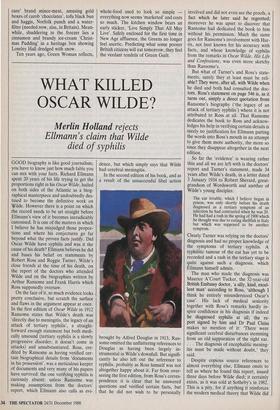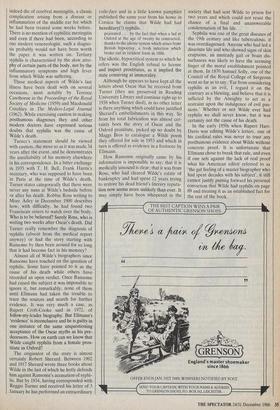WHAT KILLED OSCAR WILDE?
Merlin Holland rejects
Ellmann's claim that Wilde died of syphilis
GOOD biography is like good journalism; you have to know just how much fable you can mix with your facts. Richard Ellmann spent 20 years of his life trying to get the proportions right in his Oscar Wilde, hailed on both sides of the Atlantic as a biog- raphical masterpiece and undoubtedly des- tined to become the definitive work on Wilde. However there is a point on which the record needs to be set straight before Ellmann's view of it becomes ineradicably canonised. It is one of the matters in which I believe he has misjudged those propor- tions and where his conjectures go far beyond what the proven facts justify. Did Oscar Wilde have syphilis and was it the cause of his death? Ellmann believes he did and bases his belief on statements by Robert Ross and Reggie Turner, Wilde's close friends at the time of his death, on the report of the doctors who attended Wilde and on the biographies written by Arthur Ransome and Frank Harris which Ross supposedly oversaw.
On the face of it, so much evidence looks pretty conclusive, but scratch the surface and flaws in the argument appear at once. In the first edition of Oscar Wilde in 1912 Ransome states that Wilde's death was 'directly due to meningitis, the legacy of an attack of tertiary syphilis', a straight- forward enough statement but both medi- cally unsound (tertiary syphilis is a slowly progressive disorder; it doesn't come in attacks) and unsubstantiated. Ross, cre- dited by Ransome as having verified cer- tain biographical details from 'documents in his possession', was a meticulous keeper of documents and very many of his papers have survived: the one verifying syphilis is curiously absent: unless Ransome was making assumptions from the doctors' report, which Ellmann also calls as evi- dence, but which simply says that Wilde had cerebral meningitis.
In the second edition of his book, and as result of the unsuccessful libel action brought by Alfred Douglas in 1913, Ran- some omitted the unflattering references to Douglas as having been largely in- strumental in Wilde's downfall. But signifi- cantly he also left out the reference to syphilis, probably as Ross himself was not altogether happy about it. Far from over- seeing the first edition, from Ross's corres- pondence it is clear that he answered questions and verified certain facts, but that he did not wish to be personally involved and did not even see the proofs, a fact which he later said he regretted; moreover he was upset to discover that Ransome had dedicated the book to him without his permission. Much the same goes for Ransome's involvement with Har- ris, not best known for his accuracy with facts, and whose knowledge of syphilis from the remarks in Oscar Wilde. His Life and Confessions, was even more sketchy than Ransome's.
But what of Turner's and Ross's state- ments; surely they at least must be reli- able? They were, after all, with Wilde when he died and both had consulted the doc- tors. Ross's statement on page 546 is, as it turns out, simply a direct quotation from Ransome's biography (`the legacy of an attack of tertiary syphilis') where it is not attributed to Ross at all. That Ransome dedicates the book to Ross and acknow- ledges his help in verifying certain details is surely no justification for Ellmann putting the words into Ross's mouth in an attempt to give them more authority, the more so since they disappear altogether in the next edition.
So far the 'evidence' is wearing rather thin and all we are left with is the doctors' report and Turner's statement, made 34 years after Wilde's death, in a letter dated 3 January 1934 to'Robert Sherard, great- grandson of Wordsworth and another of Wilde's young disciples:
The ear trouble, which I believe began in prison, was only shortly before his death diagnosed as a tertiary symptoni of an infection he had contracted when he was 20. He had had a rash in the spring of 1900 which he thought was due to eating shellfish in Italy but which was supposed to be another symptom.
Clearly Turner was relying on the doctors' diagnosis and had no proper knowledge of the symptoms of tertiary syphilis. A syphilitic tumour of the ear has yet to be recorded and a rash in the tertiary stage is quite against such a diagnosis, which Ellmann himself admits.
The man who made the diagnosis was Maurice A'Court Tucker, the 32-year-old British Embassy doctor, 'a silly, kind, excel- lent man' according to Ross, 'although I think he entirely misunderstood Oscar's case'. His lack of medical seniority together with Ross's remarks hardly in- spire confidence in his diagnosis if indeed he diagnosed syphilis at all; the re- port signed by him and Dr Paul Cleiss makes no mention of it: 'There were significant cerebral disturbances stemming from an old suppuration of the right ear. . . . The diagnosis of encephalitic mening- itis must be made without doubt,' they said.
Despite copious source references to almost everything else, Ellmann omits to tell us where he found this report, issued three days before Wilde died; it certainly exists, as it was sold at Sotheby's in 1982. This is a pity, for if anything it reinforces the modern medical theory that Wilde did indeed die of cerebral meningitis, a classic complication arising from a disease or inflammation of the middle ear for which he had been treated some weeks before. There is no mention of syphilitic meningitis and even if there had been, according to one modern venereologist, such a diagno- sis probably would not have been worth the paper it was written on. Tertiary syphilis is characterised by the slow atro- phy of certain parts of the body, not by the inflammatory symptoms and high fever from which Wilde was suffering.
These medical aspects of Wilde's last illness have been dealt with on several occasions, most notably by Terence
Cawthorne in the Proceedings of the Royal Society of Medicine (1959) and Macdonald Critchley in The Medico-Legal Journal
(1962). While exercising caution in making posthumous diagnoses they and other modern doctors have expressed serious doubts that syphilis was the cause of Wilde's death.
Turner's statement should be viewed with caution, the more so as it was made 34 years after the event, and he demonstrates the unreliability of his memory elsewhere in his correspondence. In a bitter exchange in 1935 with T. H. Bell, Frank Harris's secretary, who was supposed to have been in Paris at the time of Wilde's death, Turner states categorically that there were never any nuns at Wilde's bedside before or after his death. Robbie Ross writing to More Adey in December 1900 describes how, with difficulty, he had found two Franciscan sisters to watch over the body.
Who is to be believed? Surely Ross, who is
writing two weeks after Oscar's death. Did Turner really remember the diagnosis of
syphilis (absent from the medical report anyway) or had the story starting with Ransome by then been around for so long that it had become fact in his memory?
Almost all of Wilde's biographers since Ransome have touched on the question of syphilis. Some have pointed to it as the cause of his death while others have recorded an open verdict. Once Ransome had raised the subject it was impossible to ignore it, but remarkably, none of them until Ellmann had taken the trouble to trace the sources and search for further evidence. It was very much a case, as Rupert Croft-Cooke said in 1972, of follow-my-leader biography. But Ellmann's 'evidence' is inconclusive and he is guilty in one instance of the same unquestioning acceptance of the Oscar myths as his pre- decessors. How on earth can we know that Wilde caught syphilis from a female pros- titute in Oxford?
The originator of the story is almost certainly Robert Sherard. Between 1902 and 1917 Sherard wrote three books about Wilde in the last of which he hotly defends him against Ransome's accusation of syphi- lis. But by 1934, having corresponded with Reggie Turner and received his letter of 3 January he has performed an extraordinary
volte-face and in a little known pamphlet published the same year from his home in Corsica he claims that Wilde had had hereditary(!) syphilis.
pejorated . . . by the fact that when a lad at Oxford at the age of twenty he contracted, thanks to the idiotic system which arises from British hypocrisy, a fresh infection which broke out in virulent form in 1886.
The idiotic, hypocritical system to which he refers was the English refusal to license and inspect prostitutes, as it implied the state conniving at.immorality.
Although he appears to have kept all the letters about Oscar that he received from Turner (they are preserved in Reading University Library and continue right up to 1938 when Turner died), in no other letter is there anything which could have justified Sherard's embellishments in this way. So from his total fabrication was almost cer- tainly born the story of Oscar and the Oxford prostitute, picked up no doubt by Maggs Bros to catalogue a Wilde poem they offered for sale in 1953 and which in turn is offered as evidence in a footnote by Ellmann.
How Ransome originally came by his information is impossible to say; that it is medically unsound is clear; that it was from Ross, who had cleared Wilde's estate of bankruptcy and had spent 12 years trying to restore his dead friend's literary reputa- tion now seems more unlikely than ever. It may simply have been whispered in the society that had sent Wilde to prison for two years and which could not resist the chance of a final and unanswerable condemnation of his life.
Syphilis was one of the great diseases of the 19th century and like tuberculosis, it was overdiagnosed. Anyone who had led a dissolute life and who showed signs of skin eruptions, an unsteady gait or brain dis- turbances was likely to have the accusing finger of the moral establishment pointed at them. In 1870 Samuel Solly, one of the Council of the Royal College of Surgeons went so far as to say, 'Far from considering syphilis as an evil, I regard it on the contrary as a blessing, and believe that it is inflicted by the Almighty to act as a restraint upon the indulgence of evil pas- sions.' Whether or not Wilde ever had syphilis we shall never know, but it was certainly not the cause of his death.
In the early 1950s when Rupert Hart- Davis was editing Wilde's letters, one of his cardinal rules was never to trust any posthumous evidence about Wilde without concrete proof. It is unfortunate that Ellmann chose to break that rule, and even if one sets against the lack of real proof what his American editor referred to as 'the gut feeling of a master biographer who had spent decades with his subject', it still cannot justify putting forward his personal conviction that Wilde had syphilis on page 89 and treating it as an established fact for the rest of the book.











































































































 Previous page
Previous page